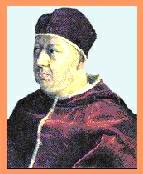|
PinkMonkey Online Study Guide-World History
2.2 Causes of the Renaissance
Many causes led to the success of the Renaissance movement.
Ideas that were not based on reason could not continue indefinitely. The
clergy in the church, in actual practice, acted contrary to the principles
of true Christianity that they are preached. This undermined faith in
the ideas of the universal church and the universal empire.
Original thinkers such as Roger Bacon and Peter
Abelard managed to weaken the intellectual authority of the church
by blazing new trails. Peter Abelard (1079 1142) felt that it was essential
to apply reason to the principles given in the scriptures. In his opinion,
the mysteries of Christianity were not to be taken for granted. They had
to be tested in the light of reason and investigation.
Another revolutionary thinker was Roger Bacon (1214-1294).
He criticized Aristotle and the church severely. He accepted from the
past whatever was reasonable and worked patiently for the cause of the
new spirit. Owing to his broad outlook and spirit of scientific investigation,
he studied subjects like mathematics, physics, natural science and philosophy.
He had the foresight to anticipate several modern invasions and wrote
about the possibility of having ships without rowers, vehicles without
draught animals and flying machines. However, owing to Baconís bold approach
and original thinking, he earned the enmity of the church, which punished
him as well as Peter Abelard.
The fall of Constantinople led to a widespread and systematic
study of Greek heritage. After Constantinople, the great center
of civilization and culture, fell into hands of the Ottoman Turks,
Greek scholars fled to various parts of Europe, where they diffused
the great ideas of ancient Greece. Thus an enthusiasm in the study
of the classics was injected into the minds of the Europeans.
A rapid spread of ideas was possible by the introduction
of the printing press. In the middle of the 15th century, John Gutenberg
was successful in operating the first printing press with movable types
at Mainz in Germany, where the Indulgences of Nicholas V running
into 31 lines was perhaps printed in 1454. In 1473, the first book was
printed in Hungary. Printing presses were also set up in 1477 in England
by Caxton, as well as in Italy by 1465.
New ideas were brought to Europe owing to the Crusades
which brought about contacts with the Arabs and other people in the East.
Voyages were conducted to new countries by adventurers.
The geographical explorers and travelers felt that it was essential to
absorb the ideas of the East and also to create new ideas. Their voyages
of exploration and discovery led to wealth and prosperity, as well as
to a broader vision.
A great role was played by progressive kings and Popes
in fostering the Renaissance. Thus Pope Nicholas V was not only a great
scholar, but also a generous patron of the scholars of classical learning.
So also, Renaissance scholarship reached its height under Pope Leo
X. Some of the nobles and rich merchants also patronized art and scholarship.
For example, artists like Michael Angelo and Leonardo da Vinci
were patronized by the brilliant Medici family of Florence.

Exhibit 2.1
Pope Leo X
Indeed the most generous patrons of artists and men of
letters in Europe were the heads of great Florentine banking firms namely
the Strozzi and the Medici. The great scholar, poet and
composer in the Medici family was Lorenzo de Medici who made 15th
century Florence resemble Athens during the days of Pericles, by creating
a similar zest and excitement of intellectual life, as also a similar
appreciation of all artistic achievements.
[next page]
|